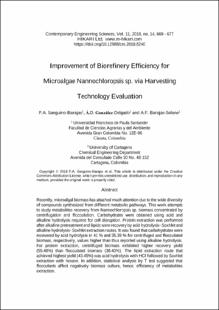Improvement of Biorefinery Efficiency for Microalgae Nannochloropsis sp. via Harvesting Technology Evaluation
Artículo de revista
2018-04-04
Contemporary Engineering Sciences
Bulgaria
Recently, microalgal biomass has attached much attention due to the wide diversity
of compounds synthesized from different metabolic pathways. This work attempts
to study metabolites recovery from Nannochloropsis sp. biomass concentrated by
centrifugation and flocculation. Carbohydrates were obtained using acid and
alkaline hydrolysis required for cell disruption. Protein extraction was performed
after alkaline pretreatment and lipids were recovery by acid hydrolysis- Soxhlet and
alkaline hydrolysis- Soxhlet extraction routes. It was found that carbohydrates were
recovered by acid hydrolysis in 41 % and 35.39 % for centrifuged and flocculated
biomass, respectively, values higher than thus reported using alkaline hydrolysis.
For protein extraction, centrifuged biomass exhibited higher recovery yield
(55.48%) than flocculated biomass (38.40%). The lipid extraction route that
achieved highest yield (43.45%) was acid hydrolysis with HCl followed by Soxhlet
extraction with hexane. In addition, statistical analysis by T test suggested that
flocculants affect negatively biomass culture, hence, efficiency of metabolites
extraction.
- Ambiente y Vida - GIAV [124]
Descripción:
Improvement of Biorefinery Efficiency for Microalgae Nannochloropsis sp. via Harvesting Technology Evaluation.pdf
Título: Improvement of Biorefinery Efficiency for Microalgae Nannochloropsis sp. via Harvesting Technology Evaluation.pdf
Tamaño: 563.4Kb
 PDF
PDF
 LEER EN FLIP
LEER EN FLIP
Título: Improvement of Biorefinery Efficiency for Microalgae Nannochloropsis sp. via Harvesting Technology Evaluation.pdf
Tamaño: 563.4Kb
 PDF
PDF
 LEER EN FLIP
LEER EN FLIP
















